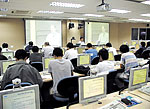
The Innovation in Manufacturing Systems and Technology (IMST) degree programme offers highly competitive courses of study that explore the many facets of manufacturing technology. Challenging coursework integrates the process, product, system, and business aspects of this vibrant industry, while focusing on the core of manufacturing systems - the operational flow problems of the factory environment.
While firmly grounded in the engineering sciences, advanced coursework will expose students to innovative theories and methodology, as well as a rigorous investigation of financial, strategic and global aspects of technology innovation and new business generation.
The Master of Science (S.M.) in IMST
A professional master's degree programme that prepares graduates to assume
technical leadership in various manufacturing industries. This one-year programme
comprises a highly integrated set of subjects and projects that cover the
process, product, system, and business components of manufacturing. The S.M.
degree offers students an opportunity to interact with the MIT faculty during
the Immersion Programme on the MIT campus. In addition, students will participate
in a theme project where a team of students works independently on broad
manufacturing themes, and individually on detailed technical and business
issues.
The Doctor of Philosophy (Ph.D.) in IMST
A research doctorate degree programme that prepares graduates for advanced
careers in industrial research and development centres, research institutes,
or academic departments interested in fundamental research in manufacturing.
The Ph.D. degree programme is a commitment of three or more years, with a
full semester of study at MIT.
IMST addresses a broad, but fundamental area at the cutting-edge of manufacturing industries. It is a multi-disciplinary programme that combines the physical fundamentals of processes and machines with the operational flow challenges of the factory. Graduates will possess a broad understanding of the many facets of manufacturing, as well as the strategic tools to become premiere leaders in technology development for existing and emerging manufacturing companies, research centers, or universities. The IMST programme will equip its graduates with:
Courses are primarily for students interested in new technologies and business ventures in manufacturing. Careers might include positions in:
The S.M., M. Eng. and Ph.D. degree programmes contain the IMST core curriculum, which includes the following courses:
In addition to the SMA core curriculum, the M. Eng. degree requires a Master's thesis, and the Ph.D. degree requires a Ph.D. thesis, as well as several additional advanced courses.
Summer Session
SMA 6301 Manufacturing Physics I: Materials and Processes (S.M., M.Eng.,
Ph.D.)
The basic modes of transformation in processes: removal, addition, phase change
and deformation. Various means for performing these transformations and the
effect of material constitutive properties. Introduction of the concepts of
process characterisation, parameters of cost, quality, rate and flexibility.
Organised by modules, each of which treats the various manifestations of a
single transformation method.
SMA 6307 Business Fundamental (S.M., M.Eng., Ph.D.)
Provides exposure to key principles and practices used in business management.
Provides opportunities to analyze cases in management of innovation.
Topics include:
Fall Session
SMA 6302 Manufacturing Physics II: Analysis, Design and Control of Automated
Equipment (S.M., M.Eng., Ph.D.)
Emphasizes a systems approach to equipment selection and/or design. Provides
exposure to selected industrial automation practices and develops the ability
to select appropriate automation methods. Fundamental building blocks: system
kinematics and dynamics, modeling uncertainty, measurement and actuation uncertainty,
control-system theory. Performance limitations: hardware kinematics and dynamics.
Use of feedback control system to meet equipment performance specifications.
Use of case studies from different applications (such as optoelectrical assembly,
laser cutting, semiconductor, etc.) Laboratory-oriented practice.
SMA 6304 Manufacturing Systems I: Analytical Methods and Flow Models (S.M.,
M.Eng., Ph.D.)
Provides ways to conceptualize and analyze manufacturing systems and supply
chains in terms of material flow, information flow, capacities, and flow times.
Fundamental building blocks: inventory and queuing models, forecasting and
uncertainty, optimisation, process analysis, linear systems and system dynamics.
Factory planning: flow planning, bottleneck characterisation, buffer and batch-size
tactics, seasonal planning, dynamics and learning for various process flow
topologies and for various market contexts.
SMA 6306 Product Design and Development (S.M., M.Eng., Ph.D.)
Covers modern tools and methods for product design and development. The cornerstone
of this subject is a project in which teams of management, engineering and
industrial design students conceive, design, and prototype a physical product.
Class sessions are conducted in workshop mode and employ cases and hands-on
exercises to reinforce key ideas.
Topics include:
SMA 6308 Professional Seminar in Manufacturing Innovation and Entrepreneurship
(M.Eng., Ph.D.)
Appreciation of global manufacturing environment. Roles of product-process
and enterprise innovation. Various models of new venture formation (internal
and external). Issues of customer responsiveness, human resource responsiveness,
physical plant responsiveness, and global market responsiveness. Fundamental
building blocks: next generation manufacturing framework, case studies and
guest speakers in process innovation, product innovation, operational innovation
and new venture formation.
Spring Session
SMA 6303 Manufacturing Physics III: Process Optimisation and Control (S.M.,
M.Eng., Ph.D.)
Process control in manufacturing processes. Discrete system feedback control
theory, empirical/adaptive modeling, and basic process physics understanding.
A general framework for modeling and control of manufacturing processes is
developed. Various existing forms of process control are studied, including
off-line optimisation, statistical process control, and real-time machine and
process control. The control approach to process physics is examined in the
context of specific manufacturing processes.
SMA 6305 Manufacturing Systems II: System Design and Optimisation
MIT provides ways to plan and design manufacturing systems and supply chains.
Introduces applicable models and software, and provides exposure to industrial
applications and cases. Focus on impact of demand and process variability,
as well as process and policy constraints on performance of supply chains
and manufacturing systems. Examines application of key tactics and countermeasures,
such as inventory, flexibility and risk pooling. Supply chain planning topics
include network inventory models, flow planning, system dynamics, value from
supply chain integration for various network topologies and for various market
contexts. Manufacturing system design topics include: integration with product
development, capacity planning and flexibility, network location decisions,
impact of product variety, impact of short product life cycles, make-buy
and supplier choice decisions.